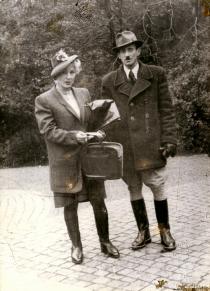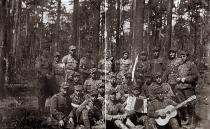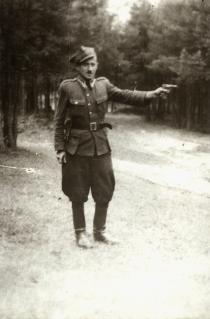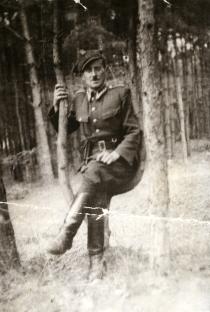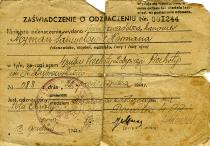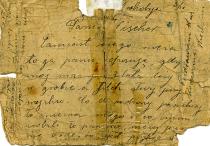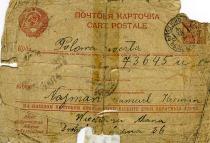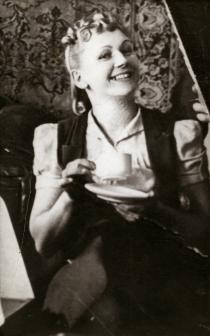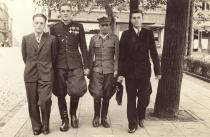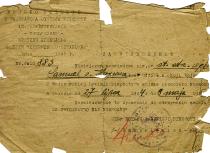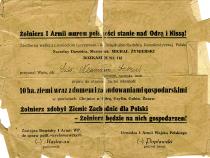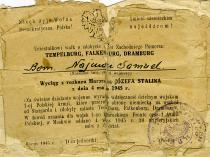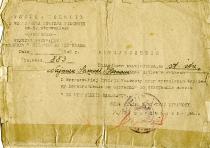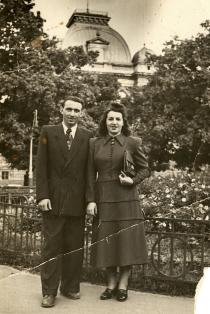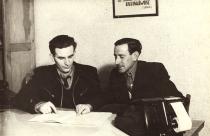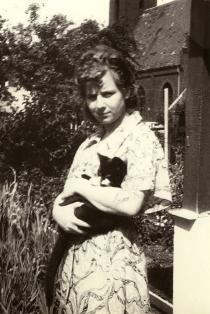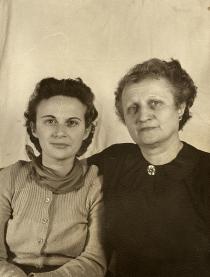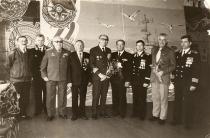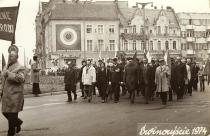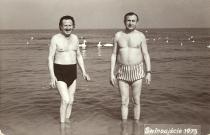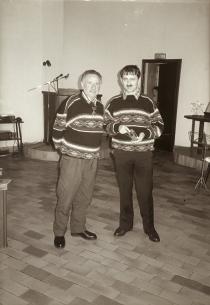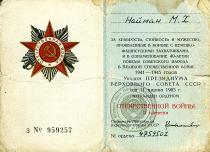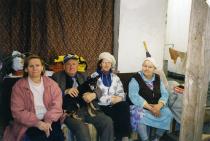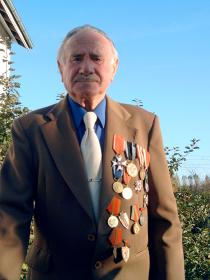This is a picture my wife Krystyna Najamn, taken just around the time when I met her in Kielce, shortly after the war was over.
There was a cool dancing party in Bokowka, that's where I met her? I went to dance, and there tables, the place is packed. There was this blonde girl. The boys, the Russians, tell me, 'Don't even approach her, she refuses everyone.' She'll refuse a guy like me? Elegant, spurred boots, dressed up? A decent haircut. I bowed before her and we danced until the whole room started applauding. I was a bit sloshed, know what I mean. We danced, and I say, 'Boys, this will be my wife.' They looked at me strangely, thinking something's wrong with me, but I tell them, 'Don't look at me like that, she'll be my wife.'
The party was drawing to an end, and I tell [the boys] I've been invited by the lady. She has an apartment, everyone will be able to take a bath. She will prepare a dinner, but you have to give your officer's word no one will touch anything. We came in the evening, the cabbage soup is waiting, steaks, coffee. After dinner everyone had a bath, and to bed. We slept on threes. In the morning we got up, thanked her, and I approach her and say, 'Krysia, my dear, we're meant for each other.' She says, 'Sir, I have a husband in the military, an officer, on the front? If it turns out he's dead, then? I like you too but at this point?'
I went away for a moment, and one of my mates immediately says, 'He's a Jew!' She replies, 'I don't care for that.' Our commander was with us. 'What kind of friends are you?' he says. 'You sat at the same table, he's gone out and you immediately say he's a Jew. What kind of friends are you?! What's wrong with being a Jew anyway? Jews have been philosophers, artists, doctors? What do have against the Jew?' And he tells me so that the other guy can hear, 'Mietek, don't associate with these people, these are not good friends.'
So that's how we met. One day she says, 'Mietek, you know what, I had this dream, the Jewish cemetery, something gold glitters there, I come closer and there's a tomb like this (shows hands arranged for the priestly blessing gesture)' I say, 'I am precisely the ha kohen - I'm the one who blesses. The blessing hands are a symbol of priestly lineage, placed on tombstones. 'Mietek, it's only you I'm telling this.' A couple of days later I arrived on horseback and I say, 'Krysia, my dear, you have children. I want nothing from you, we're just friends, but I will help you - there's the kahal in Kielce, the Jewish community council, I'll have your children dressed from head to toe there.' I got leather jackets, chocolate, halva, a whole sack of 'provisions.' Because I told them I had a wife and children. The neighbors look at me, 'What a Jew!' Because people had learned by then.
I say to her, 'Krysia, my dear, we're meant for each other, remember, I feel it in my heart. I've had various girls, young and beautiful, but nothing compares to you.' She says, 'Mietek, until I get word my husband's dead?' And one day I come in the morning and someone knocks on the door. 'Does Mrs. Sobczyk live here?' 'Yes.' 'Is she home?' 'Krysia,' I call, 'there's someone to see you!' And the messenger says, 'Your husband died on front so and so.' I say, 'Krysia, are we meant for each other?' 'Okay, Mietek, from today you live with me. You go nowhere else, you sleep nowhere else, this is where we'll live. I don't care what they say about you. You're a bachelor, I'm married, but I also fell in love with you, I've never loved anyone like you. You're so kind, you didn't know me or anything and you gave me so much, you dressed my children?' And the boy, Krystyna's son, comes and says, 'At last I have a father. A military man, with a moustache.' And that's how he won my heart. Went out on the street, telling people he had a father, he'd fear no one from now on.

